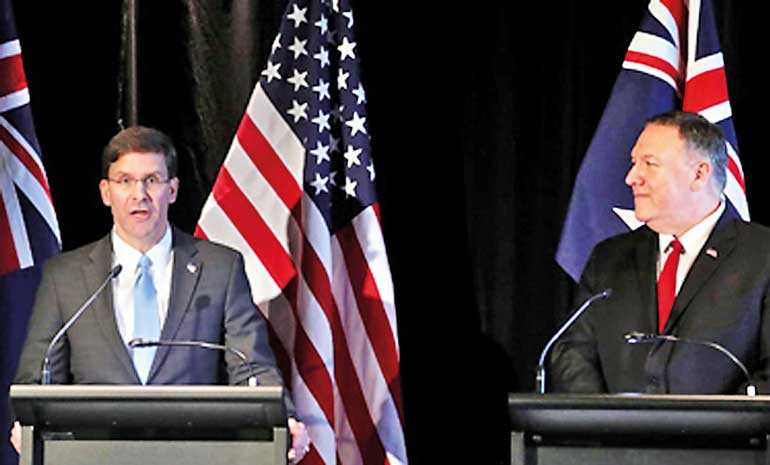Sunday Feb 22, 2026
Sunday Feb 22, 2026
Monday, 5 August 2019 00:00 - - {{hitsCtrl.values.hits}}

US Secretary of Defence Mark Esper speaks next to US Secretary of State Mike Pompeo during a joint news conference with their Australia counterparts in Sydney, Australia, 4 August - Reuters
SYDNEY (Reuters): The United States says China is destabilising the Indo-Pacific, US Defence Secretary Mark Esper said on Sunday, charging Beijing with predatory economics, intellectual property theft and “weaponising the global commons”.
The comments by Esper on his first overseas trip as US defence secretary threaten to inflame already heightened tensions between Washington and Beijing as they wage an escalating trade war.
China’s increasing assertiveness, especially in the energy-rich South China Sea, has raised concerns within the region and the United States is challenging Chinese maritime hegemony and seeking stronger ties with nations pushing back against Beijing.
“We firmly believe no one nation can or should dominate the Indo-Pacific and we are working alongside our allies and partners to address the region’s pressing security needs, Esper told reporters in Sydney.
“We also stand firmly against a disturbing pattern of aggressive behaviour, destabilising behaviour from China. This includes weaponising the global commons, using predatory economics and debt for sovereignty deals, and promoting state-sponsored theft of other nations’ intellectual property.” China has unnerved the region and angered the United States by installing military equipment and other facilities on artificial islands it has made in the disputed South China Sea. China claims large parts of the South China Sea through which roughly $3.4 trillion in shipping passes each year. Countries including Malaysia, the Philippines, Taiwan and Vietnam contest the territorial claims.
US Secretary of State Mike Pompeo on Friday decried “decades of bad behaviour” from China that have hampered free trade, laying out a case at a Southeast Asian forum in Bangkok for Washington’s trade war with Beijing. US President Donald Trump on Thursday slapped 10% tariffs on $300 billion in Chinese imports, stunning financial markets and ending a month-long trade war truce. China vowed on Friday to fight back.